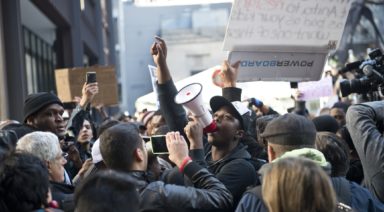Is Facebook’s 10-Year Challenge Feeding Facial Recognition Software?

If you’ve logged on to just about any social media platform within the past week or two, you’ve likely come across the “#10YearChallenge,” encouraging you to juxtapose a picture of yourself from 10 years ago with a current photo today. And while these memes may seem like harmless ways of engaging with friends and reminiscing over the past decade, tech journalist Kate O’Neill has raised a rather prescient point – should we be concerned that Facebook may be using us to train its facial recognition software?
No way! The vast majority of those photos are already uploaded to FB and Instagram, so if they wanted to do that, they already would have. Stop spreading conspiracies!
That’s been the common riposte from those who don’t want to entertain the possibility. And it’s a valid point – we’ve already given so much of our personal information to social media platforms that they absolutely have a large enough data set to train a facial recognition algorithm to a pretty high degree of confidence.
But O’Neill, a tech consultant who has penned several books on the intersection of modern technology and the human experience, poses some valid concerns with the 10-year challenge. (And sorry, why are we calling it a challenge? Is it really that difficult to post two selfies?)
O’Neill points to the fact that there is quite a bit of ambiguity and inaccuracy that would occur if you asked a bot to sift through Facebook photos the average user uploads over the course of a decade.
Some of us upload screenshots, scan offline photographs, or post the same photo several times over the course of a few years – these would all contribute to convoluted data, confusing an algorithm that wouldn’t be able to distinguish whether a photo matches the date it was posted or not. Not to mention the various illustrations, designs, cartoons, and other memes people upload as their profile pictures.
With the 10-year challenge on the other hand, users help the algorithm eliminate that ambiguity by giving it succinct, definitive comparisons that can be quickly collated using the hashtag (#10yearchallenge). And feeding it side-by-side photos of the same person having aged a fixed number of years, would allow it to recognize patterns in the way humans age.
But what about the trolls who post inaccurate photos of themselves in the meme – you know, like those funny or ironic posts?
Yes, this is inevitable, but O’Neill says this typically happens later on, after the meme has picked up steam and gone viral. One way to control for this is to create your data set from early adopters of the meme; those who post earlier are likely posting accurate photos that follow the meme’s directive – then comes the satire.
But what’s wrong with facial recognition software? Isn’t it useful for certain things like tracking down criminals and finding missing people? Yes, but it also comes with some pretty invasive pitfalls.
O’Neill says the use of this software could someday factor into things like health assessments for insurance companies. Does it look like you’re ageing quicker than average? You must not be taking care of yourself and leading a healthy lifestyle – up goes your premium, or worse, your insurance provider could drop you.
In terms of giving law enforcement and government surveillance apparatuses access to this technology, we need only look to any dystopian sci-fi theme that explores the intrusiveness of a ubiquitous facial recognition software in future societies.
And let’s not give Facebook or others the benefit of the doubt when it comes to selling your data. Remember the Cambridge Analytica scandal where 70 million profiles were harvested form unsuspecting users, all while Facebook basically knew about it? Or what about all those backdoors it provided to the NSA and other government surveillance programs Edward Snowden elucidated for us? Yeah, their track record on maintaining your privacy isn’t the greatest.
Is it possible that the 10-year challenge is just an organic trend that occurred spontaneously and this is all baseless paranoia? Quite possibly.
But based on the extensive data mining practices of Facebook and other social media platforms in the past, their use of a seemingly organic meme as a quick tool to feed software that benefits corporations and government surveillance alike, doesn’t seem that outlandish.
The takeaway? Maybe we should be more aware of these intrusive practices going into the future and demand certain boundaries regarding our privacy. Should you be afraid to take more selfies moving forward? Probably not. But maybe let’s have a little more discretion and skepticism toward potential social engineering experiments and our cavalier attitude when it comes to sharing personal data online.
Electrogravitics: Antigravity, Tesla, and a Military Cover-Up

Electrogravitics can be traced to Nikola Tesla’s work with high-voltage discharges in the late 1800s. When Thomas Townsend Brown discovered that electrostatic and gravitational fields are closely intertwined, the world changed.
In astronomical terms, gravity dominates nuclear and electromagnetic forces, which, if implemented into relatable, Earth-based technologies, would create economic and scientific paradigm shifts.
There have been thousands of attempts to produce measurable and scalable “antigravity,” a futuristic tech that theoretically produces unlimited energy for use in propulsion and other categories of technology.
Key government officials have said that the military has used antigravity tech for years. While conspiracy theorists love the subject, some say antigravity talk is cheap and comprised entirely of untested hype.
The innovative suppositions and theories in electrogravitics and electrokinetics, the base concepts for antigravity, point to the potential for tremendous technological advances. Put quite simply if you test these theories with natural progressions, the probable advances in transportation and military technologies could transform human life as we know it.
“At no time, when the astronauts were in space were they alone: there was a constant surveillance by UFOs.”
— Astronaut Scott Carpenter referring to a UFO he photographed while in orbit on May 24, 1962. NASA still has not released the photograph.




































